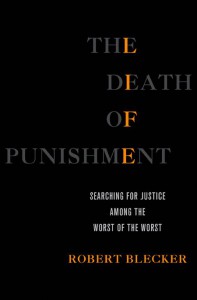 Robert Blecker is a nationally known victim’s advocate and expert on punishment, and is currently a professor of criminal law at New York Law School. He formerly prosecuted corruption in New York’s criminal justice system as a Special Assistant Attorney General and has been the sole keynote speaker supporting the death penalty at several major national and international conferences. An honors graduate at Harvard Law School and post-graduate fellow in Law and Humanities, Blecker wrote a stage play “Vote NO!” which premiered at the Kennedy Center. He has been profiled by the New York Times and Washington Post and was the subject of a USA Today cover story. He frequently appears in The New York Times, on PBS, CNN, BBC World News, and other major media outlets. The feature and TV documentary “Robert Blecker Wants Me Dead” portrays his unusual relationship on Tennessee’s death row with condemned killer Daryl Holton. ” Blecker’s extended essay, “Let the Great Axe Fall,” published as a Kindle single in October, 2011, quickly shot to #1 out of all Amazon’s non-fiction e-books and stayed for a few weeks at #1 in True Crime and Criminals and #1 in the Criminal Law category. He lives in New York. www.RobertBlecker.com.
Robert Blecker is a nationally known victim’s advocate and expert on punishment, and is currently a professor of criminal law at New York Law School. He formerly prosecuted corruption in New York’s criminal justice system as a Special Assistant Attorney General and has been the sole keynote speaker supporting the death penalty at several major national and international conferences. An honors graduate at Harvard Law School and post-graduate fellow in Law and Humanities, Blecker wrote a stage play “Vote NO!” which premiered at the Kennedy Center. He has been profiled by the New York Times and Washington Post and was the subject of a USA Today cover story. He frequently appears in The New York Times, on PBS, CNN, BBC World News, and other major media outlets. The feature and TV documentary “Robert Blecker Wants Me Dead” portrays his unusual relationship on Tennessee’s death row with condemned killer Daryl Holton. ” Blecker’s extended essay, “Let the Great Axe Fall,” published as a Kindle single in October, 2011, quickly shot to #1 out of all Amazon’s non-fiction e-books and stayed for a few weeks at #1 in True Crime and Criminals and #1 in the Criminal Law category. He lives in New York. www.RobertBlecker.com.
THE DEATH OF PUNISHMENT: Searching for Justice Among the Worst of the Worst (Palgrave Macmillan, November 19, 2013)
A passionate and counterintuitive defense of the death penalty that asks us to reconsider punishment as the key to reforming our judicial system
For twelve years Robert Blecker, a criminal law professor, wandered freely inside Lorton Central Prison, armed only with cigarettes and a tape recorder. The Death of Punishment tests legal philosophy against the reality and wisdom of street criminals and their guards. Some killers’ poignant circumstances should lead us to mercy; others show clearly why they should die. After thousands of hours over twenty-five years inside maximum security prisons and on death rows in seven states, the history and philosophy professor exposes the perversity of justice: Inside prison, ironically, it’s nobody’s job to punish. Thus the worst criminals often live the best lives.
Weaving compelling analysis around real killers and survivors, Blecker puts a personal face on this controversial subject. From Connecticut to California, and Germany to China, everywhere around the world the issue of punishment for heinous crimes has become a hot topic and this is the book – and the author – that will challenge assumptions and encourage debate on a subject that goes to the very roots of humanity.
The Death of Punishment challenges the reader to refine deeply held beliefs on life and death as punishment that flare up with every news story of a heinous crime. It argues that society must redesign life and death in prison to make the punishment more nearly fit the crime. It closes with the final irony: If we make prison the punishment it should be, we may well abolish the very death penalty justice now requires.
Praise for The Death of Punishment
“A truly remarkable and deeply moral book — an eloquent, unsparing, often counterintuitive, and sometimes painful meditation on why, whom, and how a decent society should decide to punish, and what those questions can teach us about universal truths of morality and justice. A philosophically and legally sophisticated page-turner is a rare thing to behold, but Robert Blecker has produced just that. If you want to understand what a society says about itself by the position it takes on capital punishment, this book is a must. If you think you already know what you believe about the death penalty, think again and read this book. If you care deeply about questions of right and wrong, read it twice.”
—Laurence H. Tribe, University Professor and Professor of Constitutional Law, Harvard Law School, author of The Invisible Constitution and American Constitutional Law
“Robert Blecker is probably the most articulate death penalty supporter around, and easily the most honest. His argument is one that any death penalty supporter will identify with, but more importantly, it’s one any opponent must answer.”
—David Dow, founder of the Texas Innocence Project, author of Autobiography of an Execution
“A beautifully written, passionate, principled, and provocative exploration of issues that nestle at the heart of the meaning of justice.”
—James R. Acker, Distinguished Teaching Professor, University at Albany, Editor of America’s Experiment with Capital Punishment
“A fascinating tour behind the walls of prisons and through the minds of murderers. Along the way, Blecker demonstrates why life in prison is not enough punishment for the worst of the worst.”
—Kent Scheidegger, Legal Director, The Criminal Justice Legal Foundation
“A remarkable book – eloquent, passionately argued, and disturbing in its clarion call for more punishment in prison and more pain in the death house. No one can read this book and not be deeply affected by it.”
—Robert Johnson, Professor of Justice, Law and Society, American University, Author of Death Work
“Blecker has performed a public service by forcing Americans to confront that for many of the most hardened offenders, hard time is anything but.”
—Michael Welner, M.D., Founder & Chairman, The Forensic Panel, Creator of the Depravity Scale
Reviews
“Arresting fusion of memoir and jeremiad, arguing for a punitive approach toward the worst perpetrators of social violence, amid a general overhaul of attitudes toward criminality.
Blecker (New York Law School), subject of the aptly titled documentary Robert Blecker Wants Me Dead, terms himself a “retributivist,” one who advocates “relating a criminal’s moral blameworthiness to the punishment he deserves.” He believes that in the morass of contradictory arguments regarding crime and violence since the Supreme Court’s 1972 Furman decision invalidating state death penalty laws as inconsistent, we have forgotten that when the most depraved pay the most severe penalties, the social contract is strengthened. Blecker spent 12 years interviewing imprisoned murderers near Washington, D.C., and he shows them a surprising degree of empathy: “Searching for genuine remorse among convicted killers these decades, I found it rare but real.” He believes such popular legal distinctions as “felony murder” have made incoherent notions of culpability, so that a drug murder may be regarded similarly as the actions of sadistic serial killers or rapists who murder their victims. While he respects the views of death penalty abolitionists, the author repeatedly counters their arguments with real-world examples concerning both horrific crimes and the disturbing observation that the most vicious criminals often have the most privileged circumstances in prison, the scary sound of “life without parole” notwithstanding. Given that he recognizes that abolitionists are gaining ground in many states, he advocates for “permanent punitive segregation,” “a more restrictive quality of life inside…a perpetually unpleasant punishment of life.” Blecker is unapologetic regarding his determination to avoid sophistry in considering the context of social violence. While fascinated by the “street code” of the career criminals he met, he feels bottomless contempt for the likes of mass murderers Anders Breivik and James Holmes.
While many will dismiss his viewpoint, Blecker presents a strong case with legalistic rigor on some of the darkest questions facing society.”
-Kirkus
Events
New York City
Monday, November, 23, 7:00 pm
Barnes and Noble
50 East 86th Street



